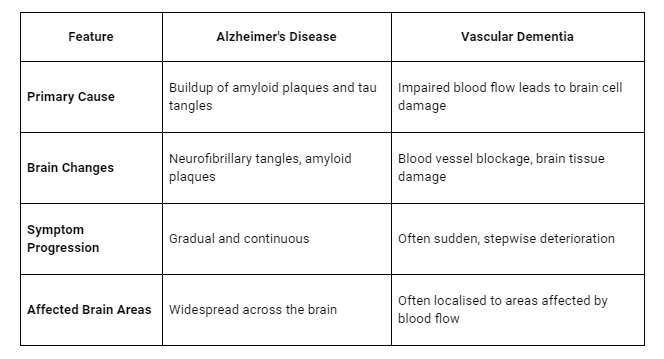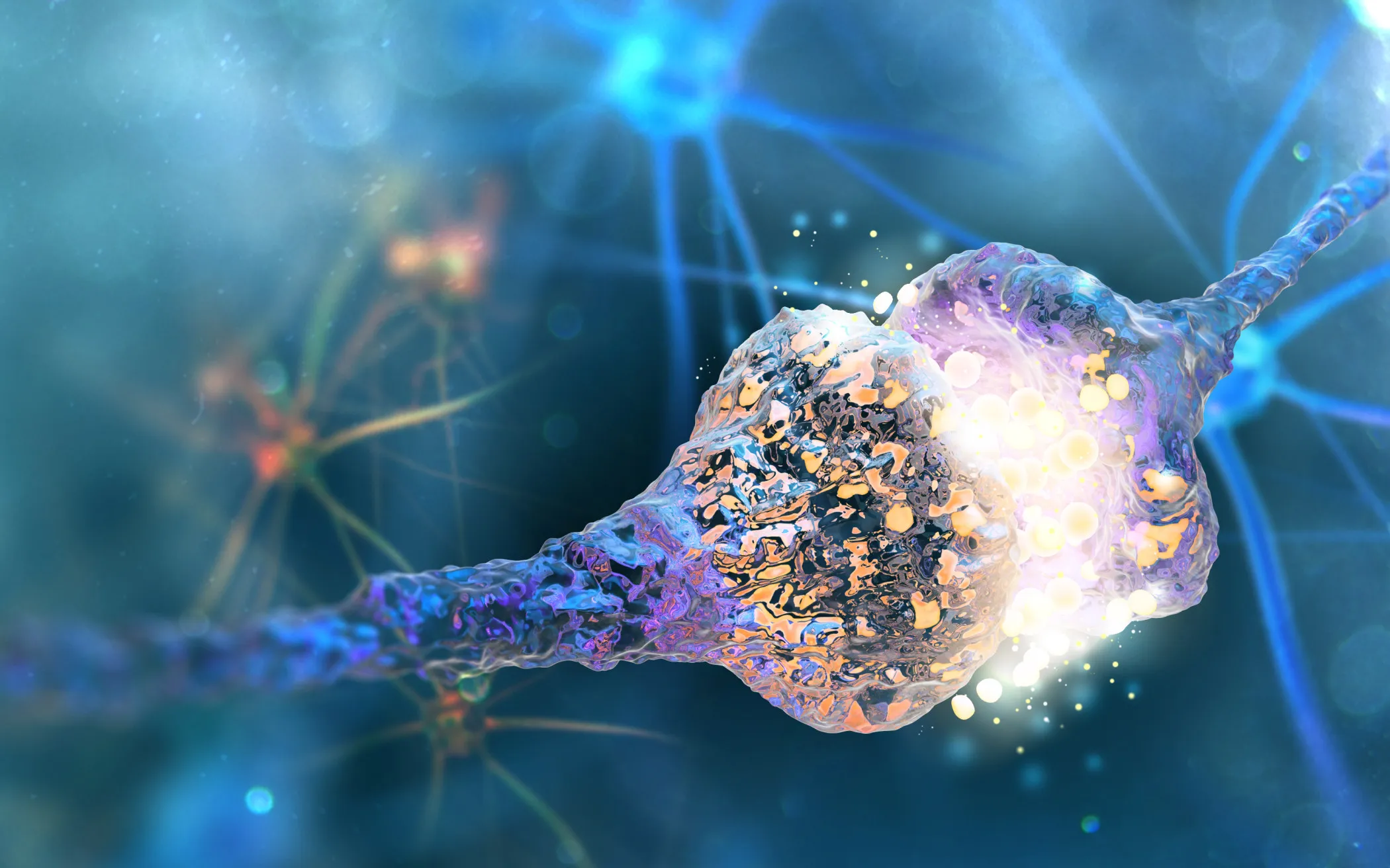Dementia is a term that encapsulates a range of medical conditions characterised by the impairment of brain functions like memory and judgement, and it impacts millions of families across the globe. Among the various types of dementia, Alzheimer’s disease and vascular dementia are particularly significant due to their widespread prevalence and the profound challenges they pose to those affected.
In the UK alone, an estimated 944,000 people live with dementia, highlighting the urgency and scale of this health issue.[1]
With vast misinformation surrounding these diseases, knowing the differences between Alzheimer’s and vascular dementia is key for families seeking to understand a loved one’s diagnosis, empowering them to make informed decisions about care and management.
Defining Alzheimer’s Disease and Vascular Dementia
Dementia has several subtypes, each presenting unique challenges and symptoms. Two prevalent forms of dementia are Alzheimer’s disease and vascular dementia, each associated with distinct pathological changes within the brain.
Alzheimer’s is known for its progressive degeneration of brain cells, while vascular dementia results from decreased blood flow to the brain, leading to cognitive decline.
Alzheimer’s Disease
This type of dementia is characterised by the gradual accumulation of beta-amyloid (Aβ) plaques and hyperphosphorylated tau tangles within the brain.[2] These protein deposits disrupt communication between neurons, leading to cell death and a progressive decline in cognitive functions such as memory, reasoning, and behavioural capabilities.
Alzheimer’s typically manifests with subtle memory difficulties that gradually escalate into severe impairment.
Vascular Dementia
Unlike Alzheimer’s, vascular dementia results directly from vascular problems, such as strokes or chronic damage to the brain’s blood vessels, leading to decreased blood flow.
The reduction in blood flow can cause cell death in brain areas critical for cognitive functions, resulting in cognitive impairments that may vary widely depending on the severity and location of the blood flow disruption. This can result from stroke or other vascular injuries that lead to infarcts or bleeding in the brain, which destroy brain tissue.
This type of dementia often presents with a more abrupt onset compared to Alzheimer’s, with symptoms that can include difficulties with problem-solving, focus, and organisation.[3]

Understanding these differences aids in accurate diagnosis and managing the conditions to slow their progression and alleviate symptoms.
Symptoms and Progression of Alzheimer’s vs. Vascular Dementia
The progression of Alzheimer’s is generally gradual and predictable, starting with mild forgetfulness and potentially leading to severe cognitive impairment. Early symptoms often include difficulty remembering recent conversations, names, or events. As the disease progresses, people may experience confusion, mood swings, disorientation in time and places, and difficulty speaking, swallowing, and walking.
In contrast, vascular dementia often presents a more abrupt or stepwise decline in cognitive function, directly tied to incidents that impair blood flow to the brain, such as a stroke. This can result in rapid changes in cognition, followed by periods of stability.
Symptoms may vary significantly based on the specific brain areas affected by strokes or circulatory issues but commonly include problems with planning, reasoning, memory, and speech. The possibility of the quicker onset of physical symptoms compared to Alzheimer’s reflects the acute nature of vascular injuries.
Diagnosis and Detection of Alzheimer’s vs. Vascular Dementia
The diagnosis of dementia, particularly distinguishing between Alzheimer’s disease and vascular dementia, involves a comprehensive assessment using various diagnostic tools.
These tools help confirm the presence of dementia and clarify the subtype, which is essential for effective management and treatment planning.
Diagnostic Techniques:
- Imaging Studies: MRI and CT scans are critical for both types of dementia, revealing different characteristics:
- Alzheimer’s: Imaging may show widespread atrophy, particularly in the hippocampus and surrounding areas involved in memory processing.[4]
- Vascular Dementia: Scans typically show evidence of cerebrovascular diseases such as stroke damage, blood vessel blockages, or changes in the brain’s white matter.
- Cognitive and Neuropsychological Tests: These tests assess memory, problem-solving, attention, counting, and language skills to identify specific patterns of cognitive impairment.
- Alzheimer’s: Marked deficits in memory and learning tasks.
- Vascular Dementia: More pronounced difficulties in attention and information-processing speed.
- Medical History and Physical Examination:
- A thorough medical history helps to identify risk factors like heart disease or diabetes, which are more prevalent in cases of vascular dementia.
- Physical examination may reveal neurological signs of stroke or other vascular problems that are not typically seen in Alzheimer’s.
It’s important to distinguish between these conditions as vascular dementia might improve with treatments aimed at the underlying vascular problems, whereas Alzheimer’s requires different approaches.
Treatment and Management of Alzheimer’s vs. Vascular Dementia
When treating and managing these conditions, the approaches taken have similarities and differences. While medication plays a role in both cases, the types of drugs prescribed may vary.
For Alzheimer’s, cholinesterase inhibitors like Donepezil and Rivastigmine, along with memantine, are often used to manage symptoms by targeting the neurotransmitters involved in memory and judgement.[6]
In contrast, treatment for vascular dementia tends to focus more on preventing further damage by addressing underlying cardiovascular issues. This may involve prescribing antihypertensives, statins, or antiplatelets to control heart disease and reduce the risk of additional strokes.
Lifestyle modifications are beneficial for both types of dementia. Adopting a balanced diet, engaging in regular physical activity, and participating in cognitively stimulating activities can help slow the progression of the disease. For those with vascular dementia, managing risk factors such as high blood pressure, diabetes, and cholesterol levels is particularly important in preventing further deterioration.
Supportive therapies also play a significant role. Cognitive behavioural therapies can help patients cope with behavioural challenges and improve their overall well-being. Occupational therapy is another valuable tool, as it assists individuals in adapting to their living environment and maintaining their independence for as long as possible.
Providing holistic care is essential for those living with dementia, regardless of the specific type. This involves creating a comprehensive plan that addresses not only physical health but also mental and emotional well-being. In addition, support groups and counselling services can be incredibly beneficial for patients and their caregivers, offering a space to share experiences, find comfort, and learn strategies for navigating the challenges of dementia.
As the disease progresses, it becomes increasingly important for families to engage in advanced planning. This includes making legal and financial arrangements to ensure that the individual’s wishes are respected and their needs are met. Engaging in these discussions early on can help alleviate stress and provide a sense of security for all involved.
Get Help for Alzheimer’s and Vascular Dementia with Assured Healthcare and Wellness
Early treatment is vital for effectively managing Alzheimer’s and vascular dementia, and Assured Healthcare and Wellness is dedicated to providing specialised care for people living with these challenging conditions. Our team can offer personalised treatment plans that address the distinct needs of each type of dementia, and we understand the importance of comprehensive care that encompasses medical treatment and emotional support.
We are committed to providing compassionate care tailored to each individual’s needs. For more information or to discuss your specific needs, please contact us today.
Sources:
- https://dementiastatistics.org/about-dementia/
- https://www.ncbi.nlm.nih.gov/pmc/articles/PMC5793225
- https://www.nia.nih.gov/health/vascular-dementia/vascular-dementia-causes-symptoms-and-treatments
- https://pubmed.ncbi.nlm.nih.gov/8835880/
- https://www.ncbi.nlm.nih.gov/pmc/articles/PMC6461571/
- https://www.nhs.uk/conditions/dementia/about-dementia/treatment/



